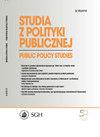Pandemic challenges vs. public policy: reflections on the electoral administration in the world's largest democracy
Studia Z Polityki Publicznej - the Journal of Public Policy Studies
Pub Date : 2022-06-06
DOI:10.33119/kszpp/2022.1.2
引用次数: 0
Abstract
Democratic elections pose an immense challenge to any government during an emergency crisis like the COVID-19 pandemic. More so for a country like India, with close to 18% of the world's population comprising an equally daunting and eager voter base of around 911 million in the time of a raging virus, both in the urban and rural areas of the nation. The first democratic large-scale election during the pandemic was successfully held in the state of Bihar in North India with more than 90 million voters, which was an astonishing feat by itself. The model followed by South Korea with the highest voter turnout provided an insight to the Indian authorities on conducting the elections. The Indian Election Commission, an independent statutory body which is entrusted with the task of conducting free and fair elections, allowed for the virtual mode of campaigning, and specific guidelines for polling were recommended. The rule changes have profound implications in significantly reducing crowded campaigns, which was synonymous with Indian democracy. The traditional lens through which the administration of elections was perceived has undergone a paradigm shift during the pandemic. New insights might surface if the electoral administration is reviewed in this study on an argumentative basis against the background of the big steps taken by the Indian election machinery. The aspects on which the research debates include: (i) the pros and cons of the action taken by the regulators; (ii) positive and negative responses from the political parties; and (iii) health and safety of the voters. The study concludes by affirming with data on the success of the Bihar Election and the wise choice of the Indian government in seizing the opportunity by taking the cues from South Korea.流行病挑战与公共政策:对世界上最大民主国家选举管理的思考
在COVID-19大流行这样的紧急危机期间,民主选举对任何政府都是巨大的挑战。对于像印度这样的国家来说更是如此,在病毒肆虐的时候,印度的城市和农村地区都有大约911亿人的选民基础,同样令人生畏,也同样热切。大流行期间,印度北部比哈尔邦成功举行了第一次民主大规模选举,有9000多万选民参加,这本身就是一项惊人的成就。投票率最高的韩国所遵循的模式,为印度当局的选举管理提供了借鉴。印度选举委员会是一个独立的法定机构,负责进行自由和公正的选举,它允许这种虚拟的竞选模式,并建议了具体的投票指导方针。规则的改变对大幅减少拥挤的竞选活动有着深远的影响,这是印度民主的代名词。在大流行病期间,人们看待选举管理的传统视角发生了范式转变。如果本研究以印度选举机制所采取的重大步骤为背景,在辩论的基础上对选举管理进行审查,可能会产生新的见解。研究辩论的方面包括:(i)监管机构采取行动的利弊;(ii)各政党的正面和负面回应;(三)选民的健康和安全。报告最后用数据肯定了印度比哈尔邦选举的成功,以及印度政府借鉴韩国,抓住机遇的明智选择。
本文章由计算机程序翻译,如有差异,请以英文原文为准。
求助全文
约1分钟内获得全文
求助全文
来源期刊

Studia Z Polityki Publicznej - the Journal of Public Policy Studies
policy studies, public policy, sociology, public administration, public health -
自引率
0.00%
发文量
15
审稿时长
60 days
 求助内容:
求助内容: 应助结果提醒方式:
应助结果提醒方式:


